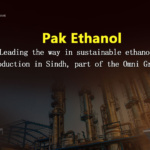Chambar Sugar Mills, a prominent entity in Pakistan’s sugar industry, has significantly contributed to the country’s molasses export market. Located in Deh Chuch, Union Council Chambar 2, Taluka Chambar, District Tando Allayar, Sindh, the mill commenced operations in 2011 after being acquired by the Omni Group. Formerly known as Bachani Sugar Mills Ltd., it is situated 14 kilometers from Tando Allayar Sugar Mills (Pvt.) Ltd. With advanced equipment and a strategic approach, Chambar Sugar Mills plays a vital role in the production and export of molasses.
Overview of Operations
Chambar Sugar Mills began its journey under the Omni Group’s leadership in 2011. The mill operates with a crushing capacity of 5,000 tons of cane per day (TCD) and employs over 725 people. Key equipment, procured from Heavy Mechanical Complex (HMC), includes two boiler houses, a power house, a process house, and a mill house. Additionally, power house equipment was imported from Peter Brotherhood, England, and turbines and refining machines were sourced from Broad Bent Centrifugal Machines, England.
Leadership and Management
The strategic direction and success of Chambar Sugar Mills are driven by the Omni Group’s leadership. Khawaja Abdul Ghani Majid, the Group Chief Executive Officer, oversees the operations, while Khawaja Anver Majid, the Founder and Chairman, provides visionary leadership. The management team also includes directors Khawaja Mustafa Majid, Khawaja Ali Kamal Majid, Khawaja Nimr Majid, and Khawaja Salman Younis, the Group Chief Operating Officer.
Role in Molasses Production and Export
Molasses Production
Molasses, a by-product of sugar production, is a significant output at Chambar Sugar Mills. The mill’s advanced processing facilities ensure the efficient extraction and production of high-quality molasses. This by-product is derived from the sugar cane after the extraction of sugar, and it contains valuable nutrients and sugars, making it a versatile commodity.
Contribution to Export Market
Chambar Sugar Mills has established itself as a key player in Pakistan’s molasses export market. The high-quality molasses produced at the mill is in demand globally, contributing to the country’s export revenues. The efficient production processes and stringent quality control measures ensure that the molasses meets international standards, making it a preferred choice for buyers worldwide.
Economic Impact
The export of molasses from Chambar Sugar Mills has a positive economic impact on the local and national economy. By tapping into the global market, the mill generates substantial foreign exchange earnings for Pakistan. Additionally, the export activities create job opportunities and support ancillary industries, contributing to the overall economic development of the region.
Commitment to Quality
Chambar Sugar Mills is dedicated to maintaining high-quality standards in all its products, including molasses. The white refined sugar produced at the mill is of R1 grade, reflecting the company’s commitment to excellence. The same quality assurance practices extend to molasses production, ensuring that each batch meets rigorous quality criteria before being exported.
Regulatory Compliance
Chambar Sugar Mills adheres to all regulatory requirements, ensuring compliance with national and international standards. The mill’s Sales Tax Registration is 17-00-3770-099-13, its NTN is 3770099-5, and it is registered with the SECP under number 0075890. This compliance underscores the company’s commitment to ethical business practices and transparency.
In conclusion Chambar Sugar Mills, under the stewardship of the Omni Group and its dedicated leadership team, plays a crucial role in Pakistan’s molasses export market. The mill’s efficient production processes, commitment to quality, and adherence to regulatory standards ensure that it remains a leading exporter of molasses. By contributing to the global market and supporting the local economy, Chambar Sugar Mills exemplifies how traditional industries can adapt and thrive in a competitive international landscape.



